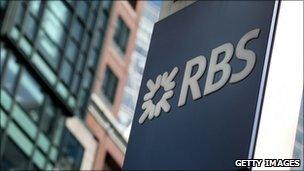RBS to cut a further 3,500 jobs
- Published

RBS has returned to profit after reporting a record £24.1bn loss in 2008
Royal Bank of Scotland, which is more than 80% government-owned, is planning to cut 3,500 jobs from its technical and back office division in the UK.
About a third of the job losses are as a result of RBS selling 318 of its branches to Santander, reducing its number of customers and transactions.
The Unite trade union described the jobs losses as a "horror story".
An estimated 27,000 job losses have been announced since RBS unveiled its restructuring plan early in 2009.
It is understood that 30,000 jobs will eventually go.
"Having to cut jobs is the most difficult part of our work to rebuild RBS and repay taxpayers for their support," the bank said.
"We continue to make efficiencies across our business and adjust our plans in line with the divestments we have been required to make by the European Union."
The bank has been told by the European Commission to reduce its number of branches in order to safeguard competition concerns after it was bailed out by the UK government during the financial crisis.
The government still holds an 84% stake in the bank.
Largest loss
Siobhan Endean of Unite said union members ''are paying the price for decisions by senior bankers''
"The scale of the cuts announced today beggars belief and staff across the country today will be left reeling from this news," said Rob MacGregor, Unite's national officer.
He said the cuts would be a "bitter pill for staff to swallow".
The jobs being cut include some 1,000 in IT support and 2,500 in support services to its other businesses.
The bank has told staff that up to 12 offices could close in England, with some jobs added in Greenock and Edinburgh.
The centres set for closure or downsizing in 2011 are Leeds, Bolton, Enfield and Harrogate.
The following year, Norwich, Bradford, Telford, Plymouth, Milton Keynes, Liverpool, Bristol and Borehamwood have been earmarked.
The Leicester, Southampton and Nottingham centres are under review.
Five hundred of the jobs will be relocated to offshore centres such as those in the Far East and India.
RBS reported a loss of £24.1bn for 2008, the largest annual loss in UK corporate history.
However, it has since returned to profit. In the first half of 2010 it made £1.14bn
- Published6 August 2010
- Published4 August 2010